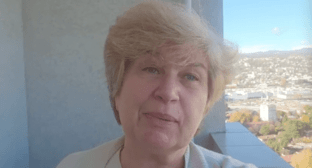14 April 2004, 11:44
Human Rights Watch: amid evidence of new atrocities, UN Human Rights Commission must take action
The bodies of nine men bearing the marks of extrajudicial execution were found in Chechnya on Friday, Human Rights Watch said today. Eight of the men had been forcibly disappeared two weeks ago after armed men, presumed to be Russian forces, took them from their homes.
The bodies were found a week before the U.N. Commission on Human Rights is to vote on a resolution calling on Russia to address abuses in Chechnya.
"This latest incident of forced disappearances and extrajudicial executions should serve as a wake-up call to those who believe that things have improved in Chechnya," said Rachel Denber, acting executive director of Human Rights Watch's Europe and Central Asia Division. "The U.N. Human Rights Commission can help break this ongoing cycle of abuse and impunity by adopting the resolution introduced last week."
About ten days ago, Human Rights Watch researchers spoke with villagers from Duba-Yurt in southern Chechnya while they were still searching for their "disappeared" relatives. They told Human Rights Watch that at around 2 a.m. on March 27, eight military vehicles bearing smudged number plates entered the village. Among the vehicles were armored personnel carriers, used exclusively by Russian forces.
A large group of masked men in camouflage uniforms, who had arrived in these vehicles, raided 19 houses in Duba-Yurt and detained 11 men between the ages of 28 and 44. Several witnesses independently told Human Rights Watch that the armed men - who spoke Russian without a Chechen accent - burst into the houses, forced the families to the floor at gunpoint, and took the men away without checking their documents or giving them a chance to dress.
The armed men released three of the detainees near the village the same night, but the remaining eight subsequently "disappeared." Among them were Bai-Ali Elmurzaev (b.1968), Idris Elmurzaev (b. 1971), Sharip Elmurzaev (b.1974), Apti Murtazov (b.1964), Lechi Shoipov (b.1960), Zelimkhan Osmaev (b.1975), Khusim Khadzhimuradov (b.1975), and Isa Khadzhimuradov (b. 1965). The men's relatives appealed to the procuracy - a government agency responsible both for criminal investigation and prosecution - and other authorities for information on their whereabouts, but received no response. Unofficial sources told relatives that the eight men were being held at the Russian military base in Khankala, yet the procuracy denied they were held there.
On Friday, local residents found nine bodies in a ravine outside Serzhen-Yurt, a village about 25 kilometers (15 miles) northeast of Duba-Yurt. The bodies bore gunshot wounds to their heads and torsos, as well as numerous signs of torture. Villagers who discovered the corpses said the men had been shot very recently. A medical doctor reportedly found that they were killed two days before. Eight of the bodies were identified as belonging to the men seized from Duba-Yurt. The ninth body belonged to another Duba-Yurt resident who had also been detained previously.
Chechen law enforcement authorities have allegedly launched an investigation, but to date have been unable to determine either the perpetrators or the place were the men had been held.
Also on Friday, a Russian court issued a ruling liquidating the operations in Russia of the Danish Refugee Counsel, a humanitarian organization that had been one of the major sources of humanitarian assistance to internally displaced persons since the renewal of the conflict in 1999. According to the court ruling, the Danish organization must cease its activity in Russia and close its offices in Stavropol, Nazran and Moscow. The liquidation hearing was initiated by the Ministry of Justice on the grounds that the organization had failed "to report the changes in the organization's leadership and its legal address."
These incidents took place just as the European Union on Thursday introduced a resolution on Chechnya at the U.N. Commission on Human Rights during its annual session in Geneva. The resolution expresses concern about continued human rights violations in Chechnya and calls on the Russian government to take urgent measures to address them. Russia responded by accusing the European Union of "putting the political process in the North Caucasus region in doubt" and "providing moral support for terrorists."
"The U.N. Human Rights Commission should not allow Russia to dictate the terms of debate," said Denber. "It is Russia's failure to stop abuses and impunity for them that's putting the political process in the region in doubt. Russia is taking for granted that the international community will just turn a blind eye to atrocities, and the Commission must dispel this perception."
Human Rights Watch also urged the European Union to use the EU-Russia ministerial meeting, set for April 14, to raise the need for urgent measures to stop abuses in Chechnya.
During the Chechnya conflict, now in its fifth year, tens of thousands of civilians have fallen victim to abuses perpetrated by both Russian forces and Chechen rebels. These abuses include indiscriminate bombings and several massacres, extrajudicial executions, forced disappearances, rape, torture and arbitrary detentions. The overwhelming majority of these crimes remained uninvestigated and unpunished.
Nevertheless, Russian authorities claim that the situation in Chechnya has been "normalized." Meanwhile, they have persistently restricted access to the region for journalists and for international humanitarian and human rights agencies, and have coerced thousands of the internally displaced to return back to Chechnya, with blatant disregard for their security.
In both 2000 and 2001, the U.N. Commission on Human Rights passed resolutions calling on the Russian government to stop abuses, establish a meaningful accountability process and invite the U.N. monitoring mechanisms to the region. Russia defied the resolutions and failed to comply with most of their recommendations.
"For too long, the world has been indulging Russia in its claims that the situation has been "normalized"," said Denber. "It's time for the world to send an unequivocal message that Russia must take real measures to stop the abuses in Chechnya."
New evidence of torture, enforced disappearances and extrajudicial executions perpetrated over the last three months in Chechnya and neighboring Ingushetia was presented on April 8 in a joint statement by Human Rights Watch, Amnesty International, the Medical Foundation for the Care of Victims of Torture, and Memorial Human Rights Center. The four organizations called on the international community to take immediate action to address the situation, and urged the U.N. Commission on Human Rights to adopt a strong resolution on Chechnya and Ingushetia.
Editors note: See also the articles "Duba-Yurt residents abducted, held at Russian base in Khankala, then found dead", "Joint statement by leading rights monitors: UN Human Rights Commission should adopt resolution on Chechnya", "Anna Neistat expects no UN sanctions against Russia for policy in Chechnya".
Source: Human Rights Watch




